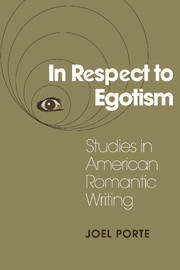Book contents
- Frontmatter
- Contents
- Preface
- Acknowledgments
- In Respect to Egotism
- Introduction: Writing, Reading, Romanticism
- 1 “Where … Is This Singular Career to Terminate?”: Bewildered Pilgrims in Early American Fiction
- 2 “Where There Is No Vision, the People Perish.…”: Prophets and Pariahs in the Forest of the New World
- 3 Poe: Romantic Center, Critical Margin
- 4 Emerson: Experiments in Self-Creation
- 5 Hawthorne: “The Obscurest Man of Letters in America”
- 6 Thoreau's Self-Perpetuating Artifacts
- 7 Melville: Romantic Cock-and-Bull; or, The Great Art of Telling the Truth
- 8 Douglass and Stowe: Scriptures of the Redeemed Self
- 9 Whitman: “Take Me as I Am or Not at All.…”
- Interchapter: Walt and Emily
- 10 Dickinson's “Celestial Vail”: Snowbound in Self-Consciousness
- Notes
- Index
- CAMBRIDGE STUDIES IN AMERICAN LITERATURE AND CULTURE
9 - Whitman: “Take Me as I Am or Not at All.…”
Published online by Cambridge University Press: 24 March 2010
- Frontmatter
- Contents
- Preface
- Acknowledgments
- In Respect to Egotism
- Introduction: Writing, Reading, Romanticism
- 1 “Where … Is This Singular Career to Terminate?”: Bewildered Pilgrims in Early American Fiction
- 2 “Where There Is No Vision, the People Perish.…”: Prophets and Pariahs in the Forest of the New World
- 3 Poe: Romantic Center, Critical Margin
- 4 Emerson: Experiments in Self-Creation
- 5 Hawthorne: “The Obscurest Man of Letters in America”
- 6 Thoreau's Self-Perpetuating Artifacts
- 7 Melville: Romantic Cock-and-Bull; or, The Great Art of Telling the Truth
- 8 Douglass and Stowe: Scriptures of the Redeemed Self
- 9 Whitman: “Take Me as I Am or Not at All.…”
- Interchapter: Walt and Emily
- 10 Dickinson's “Celestial Vail”: Snowbound in Self-Consciousness
- Notes
- Index
- CAMBRIDGE STUDIES IN AMERICAN LITERATURE AND CULTURE
Summary
In 1868, thirteen years after the debut of Leaves of Grass in America, William Michael Rossetti presented the first selection of Whitman's poems for an English audience. The edition had been achieved after much negotiation, for Whitman's sense of the integrity of his work was strong, and he insisted at first on an unexpurgated text in England as in America. But a strong antipornography law (known as Lord Campbell's Act) had been passed in 1857, and both Rossetti and the publisher, a strange character named John Camden Hotten, were unwilling to risk prosecution. (I call Hotten strange because he was himself a collector and publisher of erotica and would attempt, within five years, to capitalize on the initial, tantalizingly truncated version of Whitman's work by bringing out a complete pirated edition of Leaves of Grass with a forged American imprint.) Whitman's eagerness to develop an English following unfortunately prevailed over his better instincts as a poet, and he allowed the work to go forward, though he would later come to regret deeply this systematic emasculation of his beloved book: “I should have said, take me as I am or not at all… ” That statement might serve as Whitman's slogan, first or last, though his desire for a wider, indeed, a “refined,” audience would sometimes lead him to tone down language that seemed to promote him as the raunchy Romantic barbarian of the New World.
- Type
- Chapter
- Information
- In Respect to EgotismStudies in American Romantic Writing, pp. 229 - 242Publisher: Cambridge University PressPrint publication year: 1991



